Sungsimdang (SSD, “Sacred Heart”) celebrates sixty years and is now a food service company with 363 employees. It started as a small bakery producing steamed bread
by Kim Mi Jin
from "Economia di Comunione - una cultura nuova" n.43 - Editorial insert of Città Nuova no. 7 - 2016 July 2016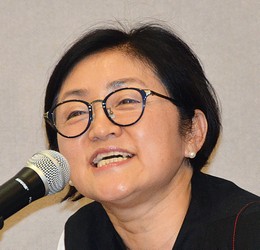
1950: War in Corea
The military ship Victory participated in the "Evacuation of Hungnam" during the Korean War. It could only hold 60 people, but for the captain's decision it delivered up to 14,000 to Geoje Harbour. It was 26 December 1950. The episode is known as the "Miracle of Christmas."
The founder of SSD owns an orchard in North Korea. With the money raised from the sale of 24 apples he could board Victory with his whole family. In 1956 he moved to Daejeon. There, thanks to two sacks of flour received from the parish, he started the production of steamed bread. After the war all the hungry people who had nothing to eat gathered at the station.
Although he was in the same conditions, he gave bread to the poor every day. This "sharing" continued for 60 years without missing a single day. The story of warm bread started spreading on everyone's lips. So SSD grew and eventually moved from the station to its present location. 60 years later...it is part of the culture of Daejon today.
1980: The son ImYoungJin (Fedes)
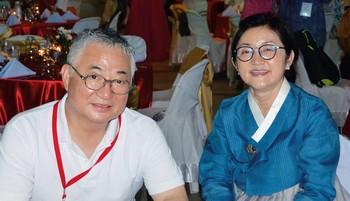 In 1980, entrepreneur Fedes and I got married. He took over the company maintaining the spirit of his father and creating innovative products such as fried Soboro and ice cream with an original packaging. Each month he organized original events that gave new emotions to customers, and this increased sales. Instead of his wife, he gave the administration over to an office worker. People were worried, because this entailed transparency in paying taxes. In 1992 the company was the largest artisan bakery of the country, the first in Korea to combine a restaurant and pastry shop in itself, spreading the culture of western food. Despite this growth, we felt a certain emptiness inside. Fedes wanted to continue along the lines of "business-bakery that does much charity" handed down from his father, but there was a difference of opinion with the staff.
In 1980, entrepreneur Fedes and I got married. He took over the company maintaining the spirit of his father and creating innovative products such as fried Soboro and ice cream with an original packaging. Each month he organized original events that gave new emotions to customers, and this increased sales. Instead of his wife, he gave the administration over to an office worker. People were worried, because this entailed transparency in paying taxes. In 1992 the company was the largest artisan bakery of the country, the first in Korea to combine a restaurant and pastry shop in itself, spreading the culture of western food. Despite this growth, we felt a certain emptiness inside. Fedes wanted to continue along the lines of "business-bakery that does much charity" handed down from his father, but there was a difference of opinion with the staff.
1995: Walking in the dark
In the '90-ies the exodus of people towards the new suburbs, the transformation of 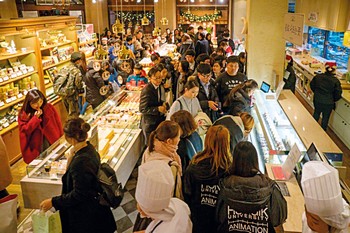 the way of life, the expansion of franchise bakeries, the parking difficulties in the old city...all this made SSD a no longer attractive place, with a sharp drop in sales. Employees began to leave the company. According to external experts we were too personal, and there was too much variety of products. However, we chose to work harder and grow instead of cutting down on our activities or products. Miraculously we eventually overcame the crisis.
the way of life, the expansion of franchise bakeries, the parking difficulties in the old city...all this made SSD a no longer attractive place, with a sharp drop in sales. Employees began to leave the company. According to external experts we were too personal, and there was too much variety of products. However, we chose to work harder and grow instead of cutting down on our activities or products. Miraculously we eventually overcame the crisis.
1999: First Encounter with the EoC
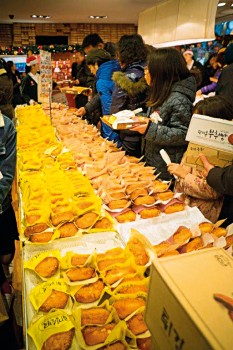 In 1999 we participated at the International EoC School in Tagaytay (Philippines) which opened a new perspective: managing the company with an altruistic spirit to contribute to the good of society. My heart was beating fast; I was not sure of being able to make it once back in reality.
In 1999 we participated at the International EoC School in Tagaytay (Philippines) which opened a new perspective: managing the company with an altruistic spirit to contribute to the good of society. My heart was beating fast; I was not sure of being able to make it once back in reality.
Would the EoC be feasible? In Korea there was still no EoC enterprise, and we had a debt of 30 billion Wons (225,000 Euros). However, we felt that the SSD's vocation was to be a model, so we began to move one step at a time. We gave 1 million won (750 euro) to the poor, the equivalent of a monthly salary of an employee. The management philosophy "Try to do well in front of all people" was established and we focused on the word "all." In the service sector, "the customer is king". But we understood that everyone we met were candidates to live universal brotherhood with.
2001: The Rosso Corporation
In 2001, the company name was changed to "Rosso Co. Ltd." We examined the budget together with our employees to pay taxes honestly, even if it was difficult because there was nothing left afterwards. We had a lot of debt and the interests of the bank to pay. People kept asking us how you could earn while paying taxes. But we wanted to show that you can make profit this way, too.
2005: Fire
In the winter of 2005 a fire broke out, which made me think that SSD would not be able to 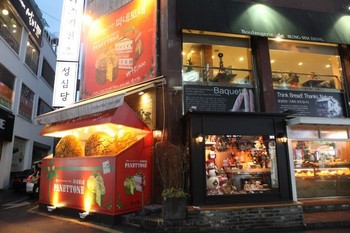 celebrate its 50 years, but I kept my calm. The next day, however, there was a surprise! All employees showed up ready to start rebuilding it with the slogan "The company is under the ashes, let us rebuild it!": in just one week we started making bread again! It was an opportunity to rethink our new image: SSD should neither be a luxury place in the eyes of the poor, nor a miserable one to those of the wealthy, but a warm place where you feel at home. It should be about warm and great bread. In addition, unlike in franchising, all the bread produced but not sold during the day goes to the poor. Although this was not a calculated marketing strategy, it brought a 30% increase in sales.
celebrate its 50 years, but I kept my calm. The next day, however, there was a surprise! All employees showed up ready to start rebuilding it with the slogan "The company is under the ashes, let us rebuild it!": in just one week we started making bread again! It was an opportunity to rethink our new image: SSD should neither be a luxury place in the eyes of the poor, nor a miserable one to those of the wealthy, but a warm place where you feel at home. It should be about warm and great bread. In addition, unlike in franchising, all the bread produced but not sold during the day goes to the poor. Although this was not a calculated marketing strategy, it brought a 30% increase in sales.
2006: celebrating 50 years
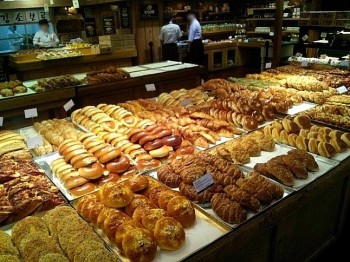 With the increased sales we were sharing 15% of profits with our employees, and 20% was donated. As a result, gifts, medals and unexpected state awards started to arrive.
With the increased sales we were sharing 15% of profits with our employees, and 20% was donated. As a result, gifts, medals and unexpected state awards started to arrive.
2011 was marked by the entry to Daejeon Lotte Department Store, and in 2012 we captured the attention of the entire country at Daejon Station. SSD became a national brand because consumers, moving inside trains with SSD bags, advertised it everywhere. That's how we became the brand to represent the city in 2014 and provide the bread during the visit of Pope Francis.
Through the TV drama "Mr. Kim, King of Bread ", the story of SSD was on everyone's lips: 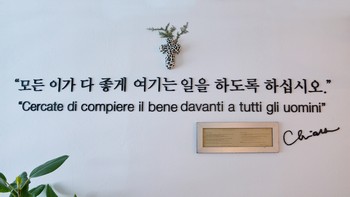 customers would visit it taking photos, making videos, and posting them on Facebook, blogs and newspapers. An incredible rain of proposals started, like opening the bakery in the huge department stores in Seoul. People were recommending "to row while there is water." Faced with these sweet temptations, the choice was not easy. In the end we decide to stay in Daejon: every weekend there is a long queue of customers in front of the store - coming from all over the country they want to buy our bread. We made a deal with the city: we promote it with our bread bags.
customers would visit it taking photos, making videos, and posting them on Facebook, blogs and newspapers. An incredible rain of proposals started, like opening the bakery in the huge department stores in Seoul. People were recommending "to row while there is water." Faced with these sweet temptations, the choice was not easy. In the end we decide to stay in Daejon: every weekend there is a long queue of customers in front of the store - coming from all over the country they want to buy our bread. We made a deal with the city: we promote it with our bread bags.
2015: Let's paint the rainbow
We try to form a community within the company, through a relationship of communion with employees, through caring about their working conditions, holidays ... and highlighting 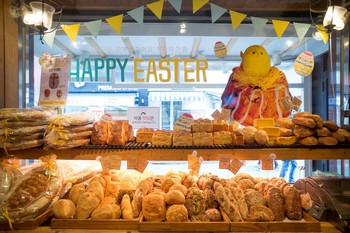 the creativity of each and every one: we want to establish a relationship of friendship. Today we are implementing the "Rainbow Project" as a concrete action plan in the company. This experience infects others, the school, the parish. For our 60th anniversary we are preparing a project to revitalize the old city in collaboration with students from Daejon University. From Japan and China 500 confectionery industry officials come each year to get to know our management philosophy. Last year we went to Shanghai to talk about our work style.
the creativity of each and every one: we want to establish a relationship of friendship. Today we are implementing the "Rainbow Project" as a concrete action plan in the company. This experience infects others, the school, the parish. For our 60th anniversary we are preparing a project to revitalize the old city in collaboration with students from Daejon University. From Japan and China 500 confectionery industry officials come each year to get to know our management philosophy. Last year we went to Shanghai to talk about our work style.
2016: My City, My SSD
If a small bakery was able to do this, it means that through our work we can do much for society. SSD began with two sacks of flour. This success is not only ours, but of those who need our help. I hope that the culture of sharing will spread around the world.







